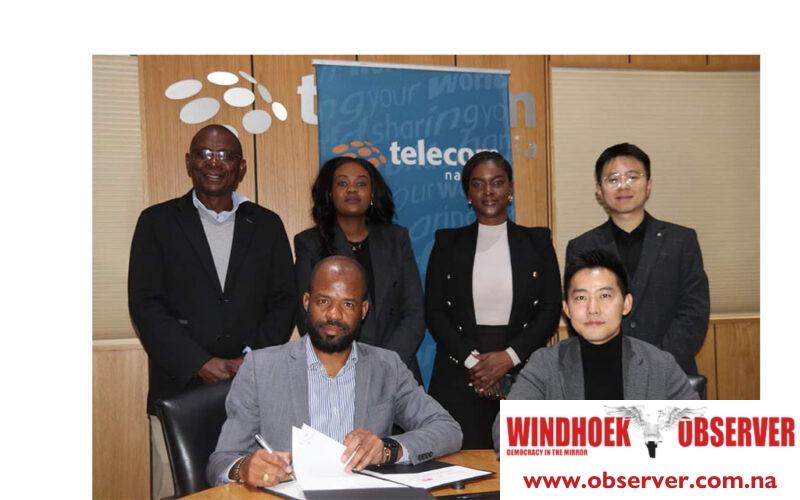Ester Mbathera
Over the past few weeks, Telecom has been mum about the persistent data services that affected clients.
On Monday, the company announced a 5-year transformative partnership with Huawei Technologies Namibia.
According to a media statement, the collaboration marks a significant step forward in revolutionising Telecom Namibia’s mobile network capabilities and coverage across the country.
“As part of the company’s five-year Integrated Strategic Business Plan (ISBP) 2027, Telecom Namibia intends to invest in the TN Mobile network modernization and coverage expansion. This will include the rolling out of new and upgrading existing mobile base stations across the country,” reads the statement.
According to the agreement, Telecom Namibia will procure cutting-edge mobile radio access equipment from Huawei to bolster its mobile network capacity and coverage across the country, including previously underserved areas.
“The partnership will facilitate the deployment of advanced mobile radio access technology such as 4G, 4.5G, and 5G in order to bring quality, fast, and reliable mobile broadband services to TN mobile consumers.
During the signing ceremony, Telecom Namibia’s chief executive, Stanley Shanapinda, said that Huawei will bring transformative solutions to its customers.
“This collaboration underscores our dedication to delivering unparalleled mobile connectivity and bridging the digital divide in communities across our country,” he said.
Michael Zhang, the managing director of Huawei Namibia, said his company is committed to supporting Telecom Namibia in achieving its goals by providing cutting-edge technology, innovative solutions, and unparalleled support.
“This partnership not only underscores our strong relationship with Telecom Namibia but also demonstrates our dedication to advancing the telecommunications infrastructure in Namibia,” he said.
However, the clients of Telecom were not impressed, demanding better services.
“It will not work just like all the other services. Just promises the cellphones does not even work two kilometres out of town and in town, it’s also very bad!” said Davey Farmer.
“But your network is still very poor either in the villages or farms or towns. There’s no place where I can say that your network coverage is good zero,” Thomas Jocy.
“Telecom Namibia kindly update your valued customers on why we can’t send text messages and make calls. I will claim back/demand for my money to be refunded. This is stealing from your client. Awaiting feedback ASAP!! I am based in Oranjemund. Your technical department can Google where the town is located,” said Oranjemund resident Visser du Preez.
Some clients said they were told the issue was related to copper cable theft by Telecom call centre staff.
Nomvula Kambinda, a telecom spokesperson, and Shanapinda, the CEO, did not respond to questions sent to them.
Information technology expert Paul Rowney explained that the issue with bad data networks goes beyond cable theft, which undoubtedly contributes significantly to the poor network performance in Namibia.
He said several other factors exacerbated the situation.
“One major challenge is the lack of adequate infrastructure development, especially in rural areas where internet penetration is already low. Additionally, limited competition among ISPs has resulted in a lack of incentive for providers to improve their services or invest in infrastructure upgrades. Regulatory barriers and bureaucratic hurdles further impede progress in this regard, as well as the lack of support for community-based operators,” he said.
He added that while there have been sporadic efforts to introduce technological advancements or innovations to improve internet service in Namibia, the pace of progress has been slow and often hindered by unfriendly regulatory policies.
According to Rowney, one potential solution lies in the adoption of alternative technologies such as satellite internet, open GSM, or expanded wireless broadband, which could bypass some of the challenges associated with traditional cable infrastructure.
“However, regulatory constraints and a lack of investment in research and development have hindered the widespread implementation of such innovations, as well as locking out community players from the prime spectrum,” he said.
Rowney added that poor internet service has profound long-term implications for Namibia’s socioeconomic development.
“In an increasingly digital world, access to reliable and high-speed internet is essential for education, economic empowerment, and social inclusion. The lack of adequate internet infrastructure not only hampers individual opportunities but also undermines the country’s competitiveness on the global stage. Without meaningful progress in improving internet access and quality, Namibia risks falling further behind in the digital economy, exacerbating existing disparities and hindering overall development efforts,” he said.
He proposed a multifaceted approach that includes regulatory reform, infrastructure investment, and innovation to address the challenges faced by internet service providers.
“By tackling these issues head-on, Namibia can unlock the transformative potential of the internet and pave the way for a more prosperous and equitable future,” he said.




